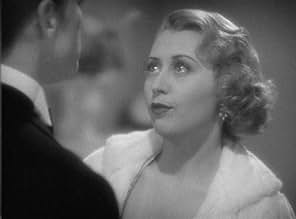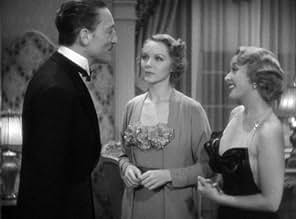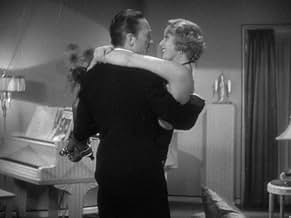Füge eine Handlung in deiner Sprache hinzuVicki Wallace teases her husband Tony until he hits her. After divorcing and marrying Vernon, her behavior leads to similar results. She returns to Tony's place, where drama unfolds with his... Alles lesenVicki Wallace teases her husband Tony until he hits her. After divorcing and marrying Vernon, her behavior leads to similar results. She returns to Tony's place, where drama unfolds with his date Bonnie and Vernon's friends.Vicki Wallace teases her husband Tony until he hits her. After divorcing and marrying Vernon, her behavior leads to similar results. She returns to Tony's place, where drama unfolds with his date Bonnie and Vernon's friends.
- Model
- (Nicht genannt)
- Judge
- (Nicht genannt)
- Duryla Model
- (Nicht genannt)
- Court Spectator
- (Nicht genannt)
- Court Recorder
- (Nicht genannt)
- Mrs. Crosby's Mother
- (Nicht genannt)
- Nightclub Patron
- (Nicht genannt)
- Model
- (Nicht genannt)
- Court Clerk
- (Nicht genannt)
- Nightclub Patron
- (Nicht genannt)
Empfohlene Bewertungen
Joan Blondell, infamous for her proclivity for shedding her clothes at parties, seems right at home in this role. Her risqué comments and coy delivery fit neatly within the framework of her character.
You could not make this movie today. Even the thought of a woman inviting physical abuse upon herself is taboo. But not in "Smarty". This brisk, if somewhat slight, film bathes in its taboo-breaking with a kind of so what bravado. The characters are friendly, even affectionate, with each other despite the blows, both physical and emotional. The breezy repartee ignores the reality of the situations, instead playing light thanks to a humorous script and crisp performances.
Yes, "Smarty" is a look back at a time before PC was de riguer and people like Will H. Hays, for better or worse, ruled cinema. If you can get past the glossing over of physical violence, you may just be lured into the lead character's web. Joan Blondell brings it. Watching her performance in this movie, I don't know why she wasn't a bigger star.
This very bizarre little comedy from Warner Bros., which sneaked in under the wire before the imposition of the Production Code, actually espouses physical abuse as the secret ingredient needed in keeping the romantic spark alive in marriage. This distressful assertion is promoted by skillful players and smug dialogue, but to no avail.
Joan Blondell, as blonde & curvaceous as ever, is portrayed as an intensely annoying young virago with all the charm of an acid bath. Endlessly nagging, the script gives her one shrill note to play, which she does with unnerving tenacity. In most of her other roles of the period she played a smart & sassy gal who has to fight her way to happiness by final fadeout. Here, Blondell starts with everything and seems determined to claw her way to the bottom again. Must be some sort of mental aberration.
Patrician Warren William & nervous Edward Everett Horton supplied wonderful moments in dozens of Golden Age films. Here, as the two men caught in Blondell's web, although they make valiant efforts, they seem out of place in the rather sordid storyline.
Rounding out the cast as two friends seemingly without meaningful lives of their own, viewers will probably find Frank McHugh to be distressingly simpleminded and pretty Claire Dodd vindictive & catty. Neither exemplify the sort of friend one would want to have during a time of domestic crisis.
Perhaps it would be well to quote a single paragraph from celebrated journalist Harriet Hubbard Ayer's essay `What Not To Do,' published in CORRECT SOCIAL USAGE (The New York Society Of Self-Culture, 1903) `Don't nag; there's nothing in it but hateful thoughts for all concerned, and such thoughts are germs that breed deceit on one side and ungovernable temper on the other. At the end of the road is division of hearts, often a divorce court.' Blondell & Company should have paid heed.
At the same time, catch the sexy Vicky (Blondell) as she endlessly rolls and unrolls her hosiery, that is, when not fitting into backless evening wear or craving a little rough man-handling. In short, it's the kind of provocative material that soon brought down the heavy hand of Hollywood censorship. (Scope out the very last scene that I expect challenged even the loose conventions of the time.)
The women are well cast, including the eye-rolling Blondell, a dryly sensible Claire Dodd, and a sweetly seductive Joan Wheeler. The problem is with the two male leads. Now, I'm a big fan of Warren William who's unequalled in ruthless, authoritative parts, e.g. Employee's Entrance (1933), Skyscraper Souls (1932), which remain true period classics. The trouble is that the role here of the discombobulated husband Tony calls for the light comedy skills of a William Powell, for example; the aristocratic William does try hard, but lacks that particular flair. Also, the naturally comedic Horton is memorable in eccentric parts, but is unfortunately miscast here as a strait-laced, jealous husband.
At the same time, director Florey doesn't manage the kind of zany pacing that could have smoothed over some of the questionable parts. Too much of his deliberate tempo comes across like the stage play the material is adapted from. As a result, the movie has its moments—mainly the super coy Blondell and a provocative parade of 30's fashions—but is otherwise a titillating disappointment.
The dimpled Claire Dodd does a good job as the divorced friend of the couple. It was also nice to note Edward Everett Horton toning down his usual effete, fuss-budget persona.
Apart from Frank McHugh's comedy relief character, none of the other characters are that likeable - they're not black and white but a lot more multi dimensional than is typical from films of this era. Even Joan Blondell is horrible whilst at the same time being utterly desirable and makes her character completely believable as someone who can manipulate these weak men, well to be honest, all men.
In typical 1930s penny-pinching WB style, this was all put together in just three weeks with people working 14 hour days. Joan was having her own serious marriage problems at the time and was so over-worked that she collapsed from mental exhaustion shortly after this was finished. Despite this and the perceived light-hearted approach to violence towards women - which is a little uncomfortable to watch (but when viewed in the context of these damaged characters makes sense), Smarty is still fun to watch and Joan somehow manages to look amazing and be convincing.
Considering it's a rush-job, it's reasonably well directed although a bit stagey at times and well acted even by WE and EEH who are out of their usual comfort zones. Overall - an enjoyable fun picture that's also a lot deeper and more thought provoking than you'd expect.
Wusstest du schon
- WissenswertesTony tells Vicki that he's been going to the movies quite a lot recently, and there the women are quite different: "They get pushed in the face with grapefruit and they love it." This is a reference to Der öffentliche Feind (1931) with James Cagney, who famously shoved half a grapefruit into Mae Clarke's face. Joan Blondell also was in that film, so this apparently is an inside joke.
- PatzerAt the 4 minute mark the boom mic shadow moves on the wall by the book shelves.
- Zitate
George Lancaster: Love is the illusion that one woman differs from another.
- VerbindungenReferences Der öffentliche Feind (1931)
- SoundtracksBridal Chorus
(1850) (uncredited)
from "Lohengrin"
aka "Here Comes the Bride"
Music by Richard Wagner
Performed by the Vitaphone Orchestra
Variation played when marriage is announced in gossip column
Top-Auswahl
Details
- Erscheinungsdatum
- Herkunftsland
- Sprache
- Auch bekannt als
- Hit Me Again
- Drehorte
- Produktionsfirma
- Weitere beteiligte Unternehmen bei IMDbPro anzeigen
- Laufzeit1 Stunde 5 Minuten
- Farbe
- Sound-Mix
- Seitenverhältnis
- 1.37 : 1
Zu dieser Seite beitragen





































